The Global Impact of Irish Peacekeeping Forces: Uniting Through Cultural Exchange
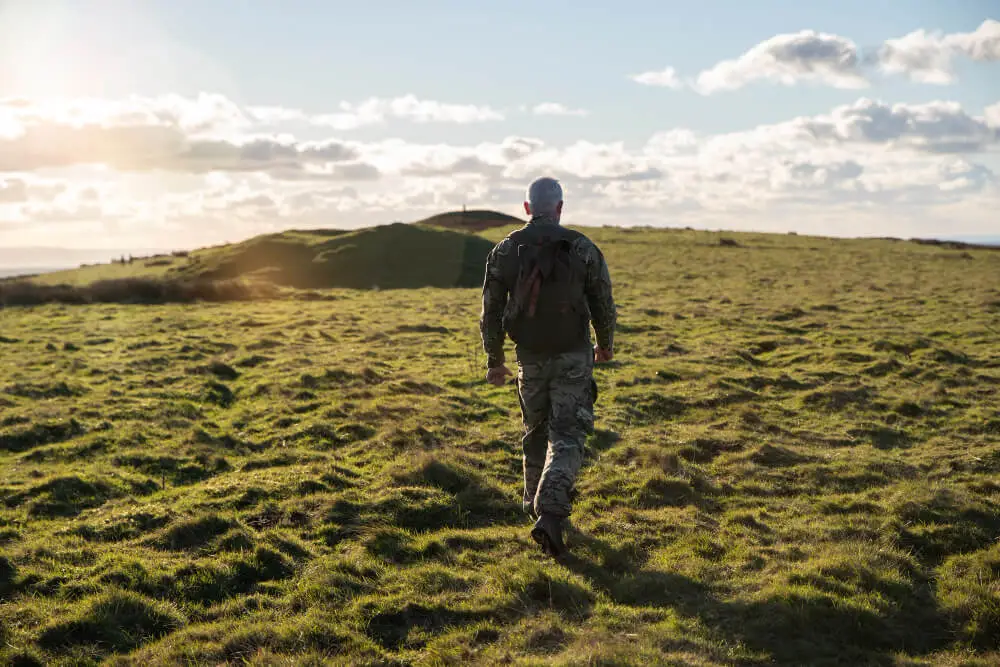
Updated On: March 23, 2024 by Yasmin Elwan
Irish peacekeeping forces have long been recognised for their significant contributions to international stability and cultural exchange. With a history steeped in neutrality and a strong commitment to peace, Ireland has been at the forefront of United Nations peacekeeping missions since the 1950s. Operating under the blue flag, Irish peacekeepers have distinguished themselves in complex and varied operations across the globe, providing humanitarian aid, protection, and support to communities afflicted by conflict.
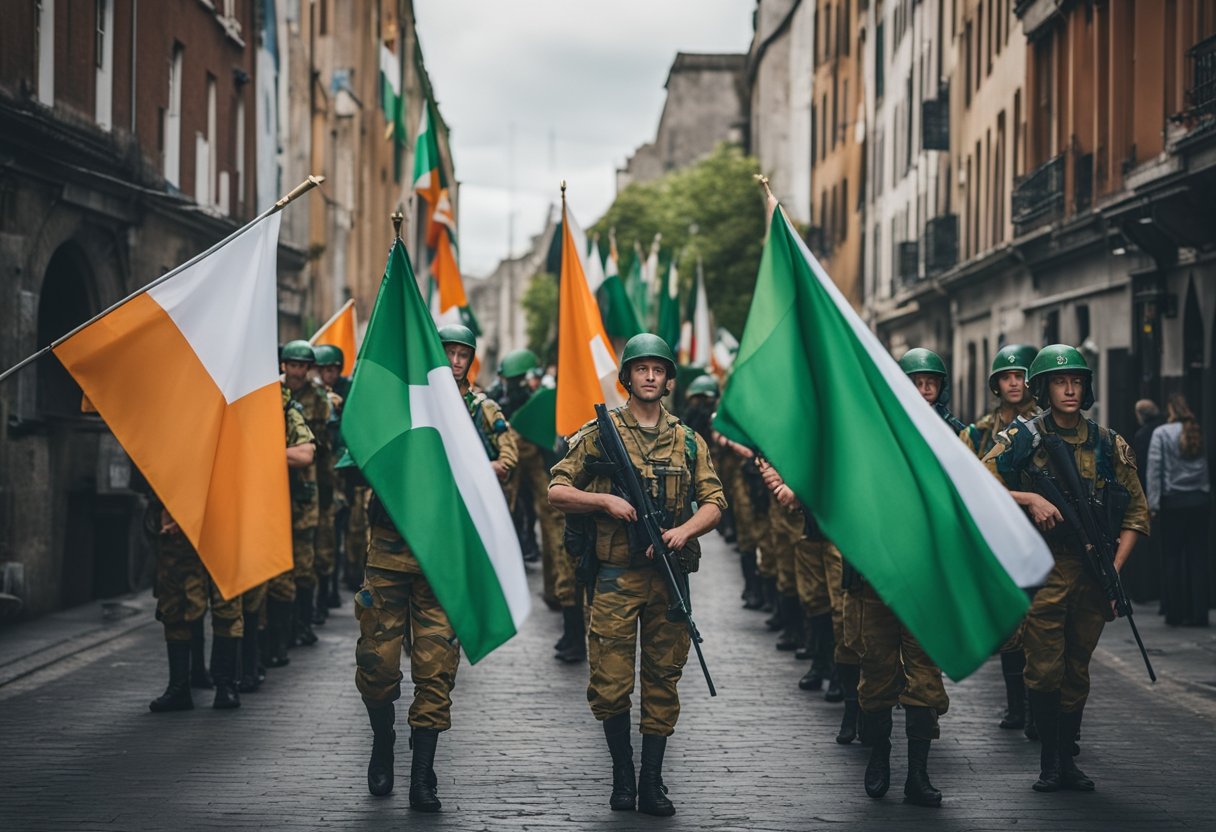
The participation of Irish forces in peacekeeping has not only been a catalyst for change in conflict zones but has also facilitated a unique form of cultural exchange. Through their interactions with local populations and other international forces, Irish peacekeepers have shared their own heritage while also gaining insights into diverse cultures. This has fostered a greater understanding and has proven essential in building the trust required for successful peacekeeping.
Historical Context of Irish Peacekeeping
The story of Irish peacekeeping is a compelling narrative that intertwines with our nation’s history of decolonisation and enduring commitment to neutrality. It’s a journey from our own experience with colonisation to a role in global peacekeeping efforts.
Inception and Evolution
The inception of Irish peacekeeping efforts can be traced back to 1958, when Ireland joined the United Nations. Our first deployment of troops to a UN peacekeeping mission was to the Congo in 1960. This foundational mission marked the beginning of what would become a proud tradition of Irish participation in international peace and security.
Over the decades, Irish peacekeeping has evolved to meet the changing demands of international peacekeeping landscapes. From our early engagements in the Congo to our significant contributions in Lebanon and beyond, Irish forces have been a stabilising presence. The evolution of Irish peacekeeping has adapted to complex environments while maintaining the core principles of impartiality and effectiveness.
Decolonisation and Irish Neutrality
Our historical narrative is deeply tied to the process of decolonisation, as Ireland itself emerged from British rule in the 20th century. This experience profoundly shapes our understanding and empathy in peacekeeping contexts, especially in regions grappling with the aftermath of colonisation.
Irish neutrality, established in the 1930s, has played a pivotal role in our approach to international relations and peacekeeping. Our neutral stance has allowed us to serve as unbiased and trusted peacekeepers on the world stage. We do not align with military alliances, which reinforces our capacity to act as honest brokers in conflict situations and maintain a unique position within the international community.
Irish Peacekeeping Missions Overview
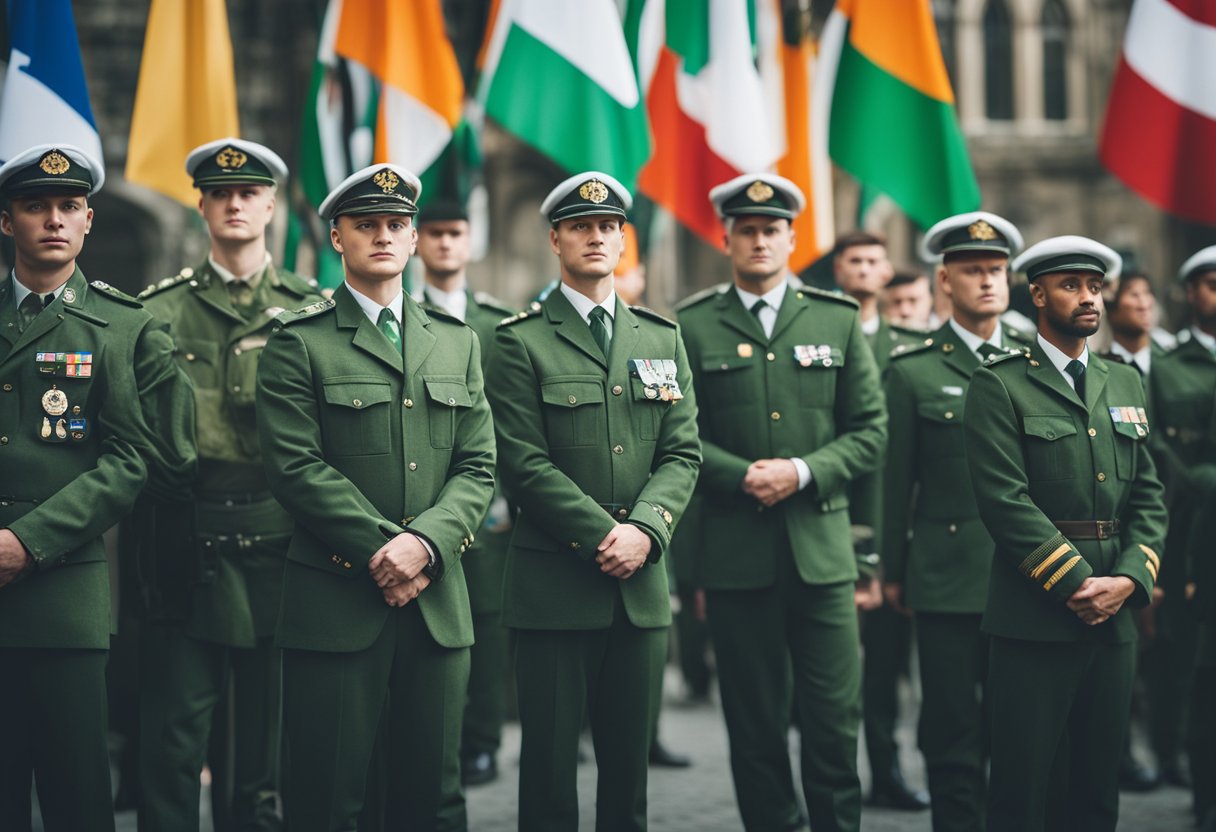
We have witnessed the profound impact that Irish peacekeeping forces have had on global peacekeeping efforts. Their commitment to these operations has fostered cultural exchange and strengthened Ireland’s reputation on the international stage.
UNIFIL in Lebanon
UNIFIL, the United Nations Interim Force in Lebanon, has been a cornerstone of peacekeeping missions since its establishment in 1978. Our troops have been instrumental in maintaining peace and stability along the volatile Lebanon-Israel border. Over the years, Ireland has sustained a significant presence in these operations, contributing both military and civilian personnel who work tirelessly to promote peace.
UNFICYP in Cyprus
Since the inception of the United Nations Peacekeeping Force in Cyprus (UNFICYP) in 1964, we’ve been steadfast in our contribution. Our peacekeepers have played key roles in patrolling the ceasefire lines, offering humanitarian assistance, and being a part of confidence-building measures between the parties, which has been vital in maintaining the buffer zone on the island.
SFOR and EUFOR in the Balkans
Our involvement in the Balkans via the NATO-led Stabilisation Force (SFOR) and, subsequently, the European Union Force (EUFOR) underscored our firm support for peace enforcement operations. In regions like Kosovo and other parts of the Balkans, our forces have safeguarded the security that is essential for rebuilding communities. Our peacekeepers have facilitated a safer environment for cultural and political reconciliation, reflecting Ireland’s dedication to perpetual peace and security efforts.
Ireland’s Role in United Nations Peacekeeping
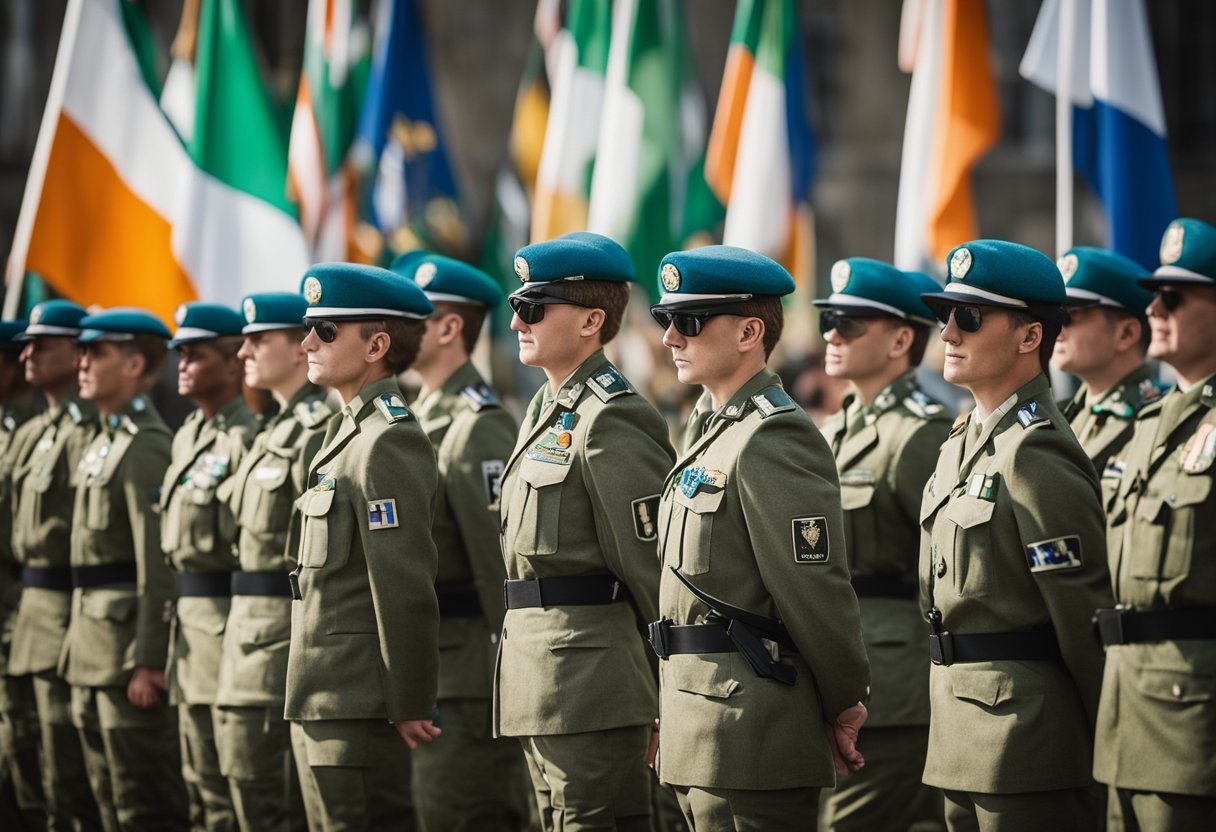
As an active participant in UN peacekeeping efforts, Ireland has made significant contributions through its Defence Forces and has played an instrumental role in the Security Council to foster global peace and security.
Contributions to UN Forces
Since the establishment of the United Nations Peacekeeping in 1948, the Irish Defence Forces have been an integral part of multi-national peace support operations worldwide. Over the years, Ireland has dispatched its troops to some of the most challenging and delicate situations across different continents. These men and women have not only upheld peace in conflict zones but have also facilitated cultural exchanges, gaining respect internationally for their discipline and empathy in complex environments. For instance, 130 Irish nationals are currently deployed to the UN Disengagement Observer Force (UNDOF) to monitor the ceasefire in the Golan Heights.
Participation in the UN Security Council
Our nation’s role on the United Nations Security Council reflects Ireland’s commitment not just to peacekeeping but also to the strategic decision-making processes that underpin the missions of the UN. Ireland’s term on the Council involved active engagement and leadership, contributing to important goals for peace operations and advocating for modernisation to meet evolving global challenges. This participation underscores our commitment to international law and the UN’s core objectives.
Political Dimensions in Peacekeeping Efforts
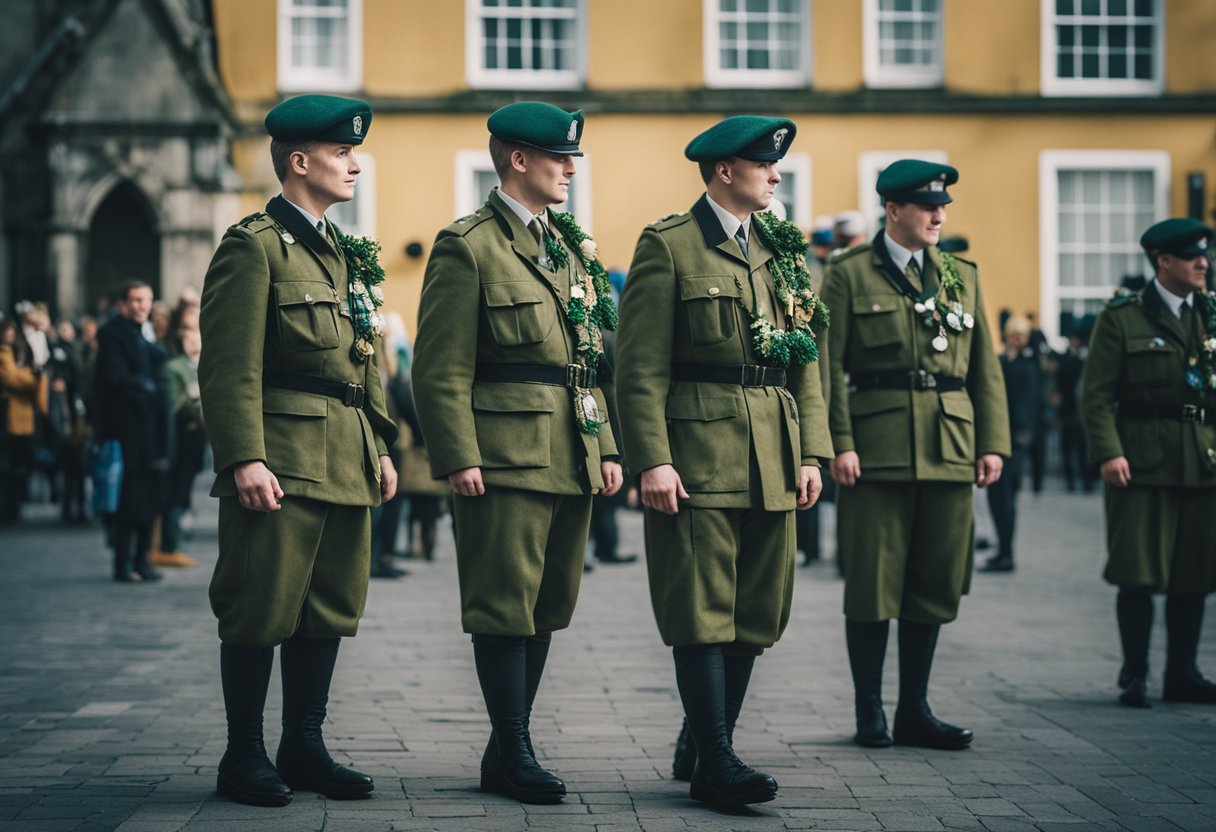
Peacekeeping efforts by Irish forces encompass a range of political dimensions that influence global peace and security. These include engaging with political frameworks and contributing to conflict resolution strategies.
Interaction with Political Entities
We note that our peacekeepers regularly engage with a variety of political entities, ranging from local governments to the United Nations. This interaction is multifaceted, including liaising with parties in conflict and working within the frameworks of international law. It’s also underpinned by Ireland’s commitment to upholding human rights and supporting democratic processes.
Influence on Conflict Resolution
Outcomes in peacekeeping are often influenced by the involvement in processes that contribute to resolving conflicts. Irish peacekeeping forces take a hands-on role in conflict resolution by providing a neutral ground for dialogue and negotiations, guided by principles laid out in Ireland’s White Paper on Defence. Through these efforts, we play a part in facilitating sustainable peace in regions marred by political strife.
Socio-cultural Impact of Irish Peacekeeping
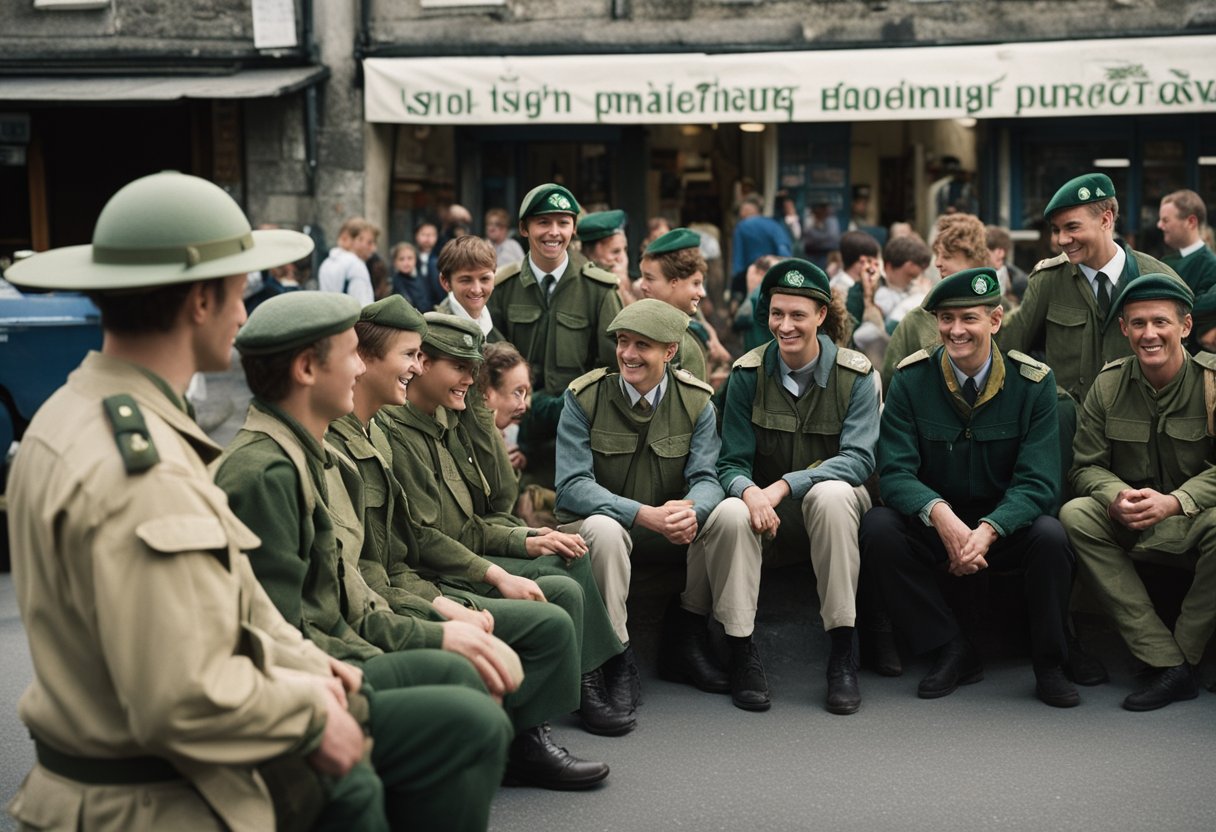
As Irish Peacekeeping forces engage in missions abroad, they create lasting socio-cultural impacts. Through cultural exchanges and humanitarian efforts, they not only contribute to peace and stability but also foster intercultural relationships and assist societies in need.
Cultural Exchanges and Relations
Our peacekeeping tradition has been instrumental in promoting a positive image of Ireland abroad. Irish peacekeeping missions have facilitated cultural exchanges by interacting with local communities and sharing our culture, values, and ethos. These interactions often result in mutual respect and understanding, with Irish personnel learning as much about the host nation’s culture as they impart knowledge of our own. It is not uncommon for these missions to include socio-cultural studies, which help to enhance diplomatic relations and foster goodwill between nations.
Humanitarian Assistance in Host Nations
In the course of our missions, we often provide crucial humanitarian assistance to host nations. This assistance ranges from emergency medical aid to long-term developmental support, always taking into account the cultural sensitivities and societal structures of the communities we serve. Our engagement reflects our core values of empathy and solidarity, with a clear understanding that aid is most effective when it respects the culture and needs of the people it is intended to help.
Through our actions, we not only contribute to achieving peace but also have a significant, positive impact on the socio-cultural fabric of the societies we operate in. Our peacekeepers often become ambassadors of Irish culture, embodying an ethos of service and humanitarian assistance that is respected worldwide.
Military Strategies and Information Operations
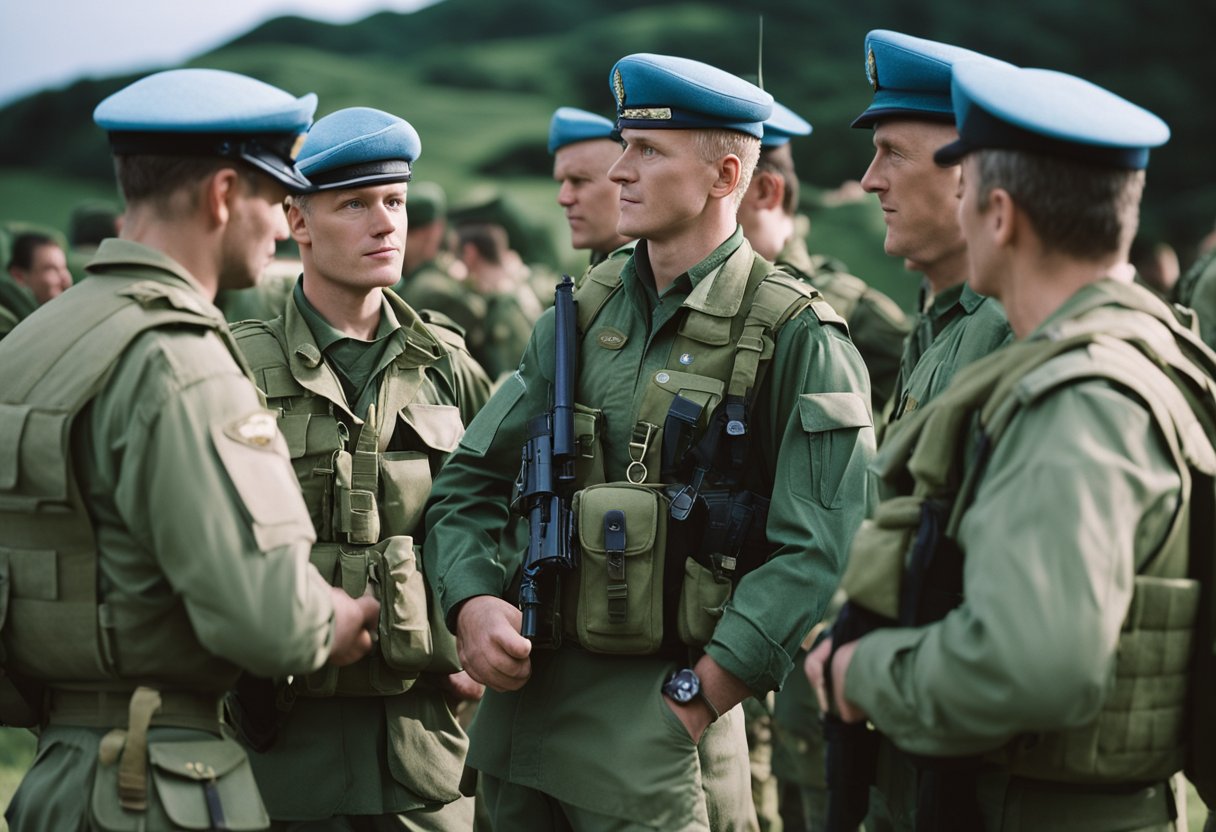
In this section, we explore the vital roles and approaches of the Irish Defence Forces in the realm of military strategies and information operations. We focus on the training provided to prepare for peacekeeping missions and the importance of sharing intelligence to enhance the effectiveness of operations worldwide.
Defence Forces Training
Our Defence Forces undergo comprehensive training designed to equip them with the necessary skills and knowledge to conduct successful peacekeeping missions. This training includes advanced courses in military strategy, tactical manoeuvres, and capacity building. The White Paper on Defence emphasises the importance of continuous learning and adaptation, reflecting on peacekeeping lessons learned to refine our strategies. Strategies and tactics are not merely theoretical but consistently aligned with ground realities and the intricate dynamics of international peacekeeping.
Intelligence and Information Sharing
Effective information operations are a cornerstone in the success of our peacekeeping endeavours. The Irish Army prioritises the exchange of mission-critical information with international allies to enhance situational awareness across all levels. Intelligence sharing constitutes a strategic asset, enabling informed decision-making and allowing for proactive responses to emerging threats. Collaboration with global partners ensures a synergised approach to maintaining peace and security, relying on cutting-edge research and field data to guide our actions.
The Economic Aspects of Peacekeeping Efforts
In considering the economic impact of peacekeeping, it is critical to understand the funding mechanisms that make these missions possible as well as the tangible effects on our domestic economy.
Funding and Resource Allocation
Our defence forces, as contributors to global peacekeeping efforts, receive funding and resources from diverse channels. International peace operations are often financed through contributions made to organisations such as the United Nations. Allocation of funds is typically directed towards mission-specific requirements, logistical support, and the welfare of the deployed troops. Extensive research is conducted to ensure the efficient utilisation of resources, maximising the positive outcomes of peacekeeping missions while limiting unnecessary expenditures.
Impact on Irish Economy
Our nation’s involvement in peacekeeping has a significant influence on our economy. The deployment of Irish forces abroad facilitates the exchange of expertise and generates opportunities for cultural and economic ties. The defence equipment and resources needed for such operations stimulate domestic production and can lead to the opening of new markets, contributing to economic development. Peacekeeping lessons learned abroad can be reinvested within our industries and academia, further enriching our socio-economic fabric.
Lessons Learned and Capacity Building
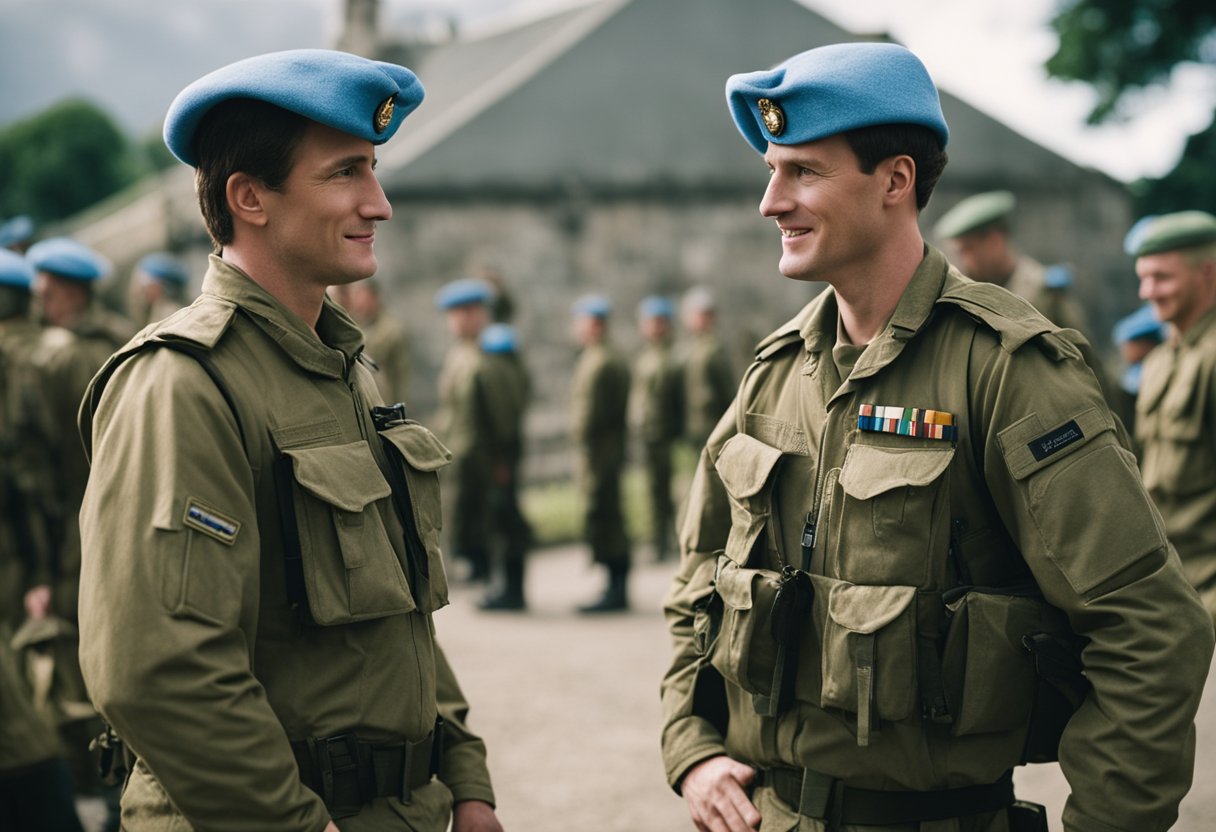
Our peacekeeping missions have always been about more than just monitoring ceasefires; they’ve been instrumental in enhancing our defence capabilities and fostering international collaboration. Through careful research and engagement in peacekeeping operations, we’ve learned vital lessons that now guide our ongoing commitment to global security and cultural exchange.
Development of Irish Defence Capabilities
We’ve seen a marked improvement in our Defence Forces’ capacity stemming from continuous peacekeeping duties. Through deployments, particularly in demanding environments like Lebanon, our forces have honed their tactical and logistical proficiencies. Engagements in UN peacekeeping have been instrumental in this growth, allowing us to streamline command structures and reinforce our operational effectiveness. Importantly, each mission contributes to an ever-growing body of intelligence, building a stronger, more responsive military for Ireland.
Knowledge Exchange with International Alliances
The Irish Defence Forces’ extensive peacekeeping experiences have positioned us well to share invaluable insights with our international allies. Our participation in UN operations has, in turn, allowed us to gain knowledge from the vast reserve of international peacekeeping. This reciprocal exchange cuts across cultural and national boundaries, enriching both our understanding and approaches to conflict resolution. Coordination with multinational forces underscores the shared commitment to global peace and the indispensable nature of collaborative capacity building.
Peacekeeping Influence on Irish Society
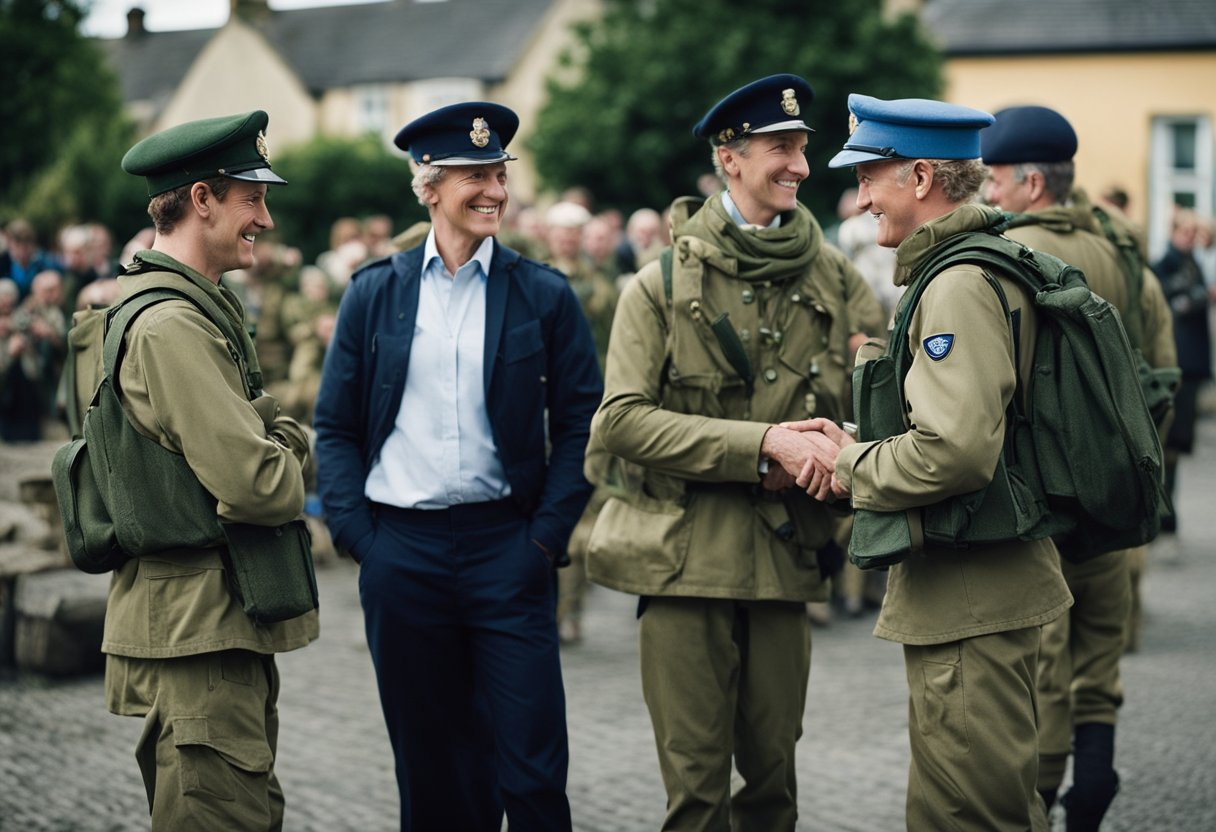
The longstanding commitment to international peacekeeping missions has left a distinct imprint on Ireland’s culture and ethos. Our nation takes pride in this tradition, which reflects our societal values of empathy and global responsibility.
Public Perception and Support
In Ireland, public opinion on our nation’s role in peacekeeping is generally positive. Our society applauds the peacekeeping tradition, acknowledging how these missions align with our national ethos of neutrality and dedication to conflict resolution. The involvement in peacekeeping has become a source of national pride, reinforcing Irish values such as compassion and solidarity with those affected by conflict.
Irish peacekeepers’ accounts from missions abroad have enriched our cultural understanding and strengthened support among citizens. This support is evident in community activities, media coverage, and discussions that honour peacekeeping efforts. An example lies within the educational sector, where tales of peacekeeping are included in curricula to illustrate the principles of peace and societal cohesion.
Irish Peacekeepers in Society
Upon returning home, Irish peacekeepers integrate their unique experiences into local communities, fostering cultural exchange. They share tales that bring a piece of the world back to Ireland, thus broadening our collective perspective. Hosted talks and interviews with returned peacekeepers attract attention, serving as community events that bolster a sense of connectedness to global societies.
Within the fabric of daily life, ex-peacekeepers often carry forward the values and learnings from their missions. They become living embodiments of Ireland’s commitment to peace and can influence societal attitudes towards global issues. Engaging with various cultures and communities overseas informs their approach to inclusion and diversity, which in turn enriches the cultural tapestry of Irish society.
Irish Peacekeeping Personalities and Anecdotes
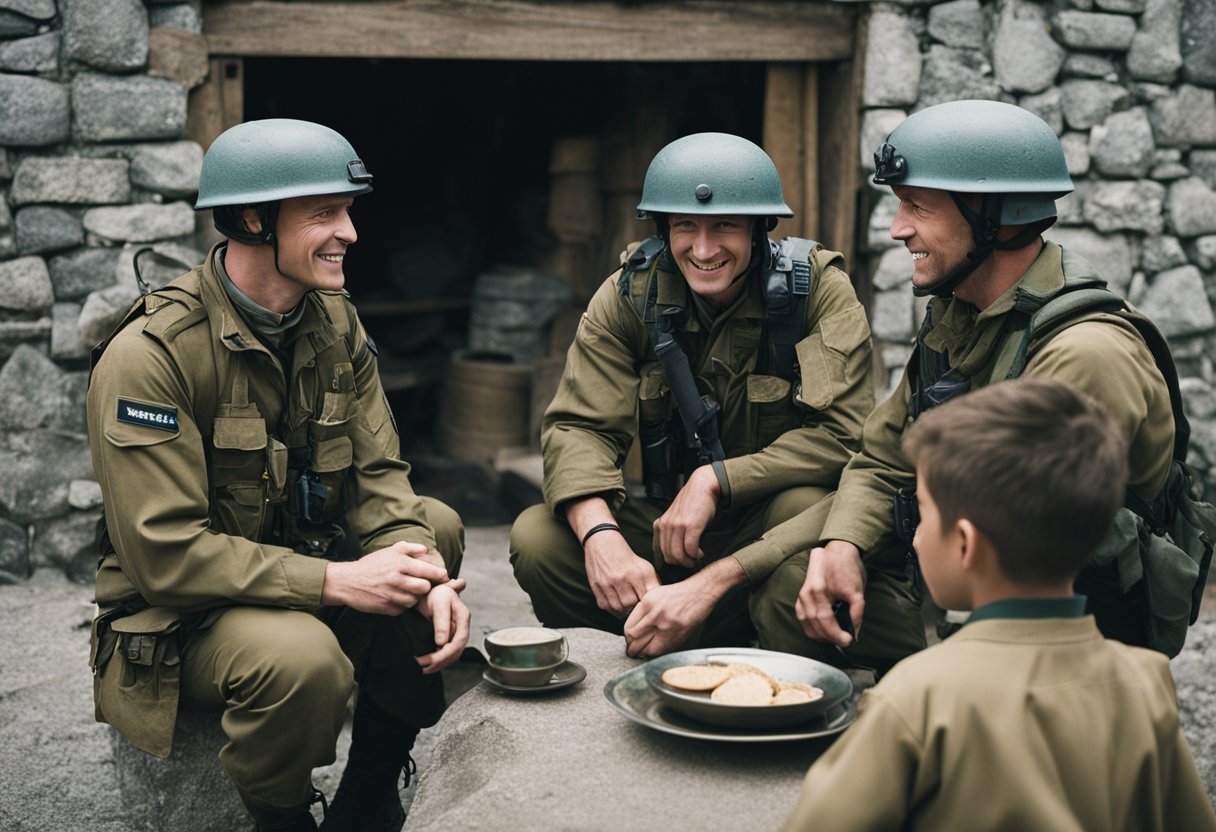
As we delve into the global impact of Irish peacekeeping forces, we come across many unique stories that highlight their role in cultural exchange. Within the context of their missions, individual personalities stand out, bringing a human face to international peacekeeping efforts. Let’s explore some of these personalities and the anecdotes that shed light on their contributions.
Edward Burke and Jonathan Marley
Edward Burke is a respected figure whose expertise in the field of peace and conflict studies has informed the practices of Irish peacekeeping. His insights have been instrumental in shaping the strategic approach of Irish forces on the ground. Jonathan Marley, on the other hand, is known for his scholarly work on the evolution of Irish peacekeeping, underlining its progression and the wider historical context that it operates within. Together, Burke and Marley’s contributions provide a comprehensive understanding of the ethos and methodology that guide Ireland’s peacekeepers during their missions around the world.
Peacekeepers in the Field of Sport
Sport is a powerful force for unity and cultural exchange, and Irish peacekeepers are no strangers to this. Through football matches and other sporting activities, Irish peacekeepers have engaged with local communities, fostering goodwill and camaraderie. These activities not only reinforce positive relationships between peacekeepers and civilians but also shine a light on the shared passions that transcend cultural and linguistic barriers. In places where the Irish have served, such as Lebanon and the Congo, their involvement in sport has left a lasting impact, bridging divides and nurturing a sense of shared humanity.
Frequently Asked Questions

In this section, we address common inquiries surrounding the international impact of Irish peacekeeping forces and their rich history of cultural exchange.
How have Irish peacekeeping forces influenced international relations through cultural exchanges?
Irish peacekeeping forces have served as bridge builders in conflict zones, often bringing a sense of camaraderie and trust. Their presence has facilitated cultural understanding between local communities and the international community, fostering better global relationships through the soft power of cultural diplomacy.
What roles have Irish peacekeepers played in key global peacekeeping missions?
Across diverse missions, Irish peacekeepers have undertaken roles ranging from observers to combat troops and facilitators of humanitarian aid. The adopted strategies in such missions have often reshaped the nature of peace support operations, emphasising the importance of adaptability and local engagement.
In what ways has Ireland’s foreign policy shaped its contribution to global peacekeeping efforts?
Ireland’s foreign policy, with its firm commitment to neutrality, has allowed it to engage in peacekeeping without the baggage of colonial history. This unique stance has often enabled Irish forces to operate as impartial actors, influencing their approach to global peacekeeping and improving their efficacy as peace brokers.
Can you describe the historical significance of the Siege of Jadotville in the context of Irish peacekeeping?
The Siege of Jadotville in 1961 stands as a profound marker of Irish peacekeeping valour. Despite being heavily outnumbered, the Irish Army’s ‘A’ Company, part of the UN forces in the Congo, held their ground without fatalities, epitomising the bravery and tactical acumen of Irish soldiers in peacekeeping history.
What strategies has Ireland implemented to align its international development priorities with peacekeeping?
One key strategy has been the integration of peacekeeping with international development policies. Recognition of the interdependence between peace and development has guided Irish forces to not only maintain stability but also contribute to long-term socioeconomic growth in the regions they serve.
How does the experience of Irish peacekeepers abroad contribute to Ireland’s domestic and foreign policies?
The field experience of Irish peacekeepers enriches Ireland’s strategic insights into conflict resolution, helping to shape both domestic security strategies and diplomatic initiatives abroad. These experiences ensure that Ireland’s policies remain informed by the practical challenges and successes encountered in theatres of peacekeeping worldwide.






